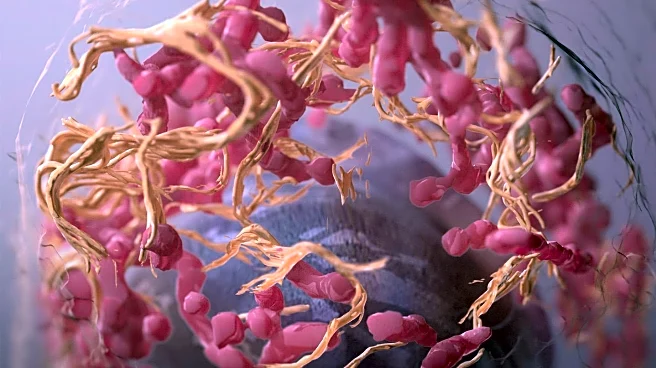What is the story about?
What's Happening?
Researchers at the Centre for Genomic Regulation (CRG) in Barcelona have discovered that a single drug, already approved for medical use, can stabilize nearly all mutated versions of a human protein known as G-protein-coupled receptor (GPCR). This breakthrough was published in Nature Structural & Molecular Biology. The study, led by Taylor Mighell, PhD, and Ben Lehner, PhD, demonstrates that the drug tolvaptan can restore receptor levels to near normal for 87% of destabilized mutations. GPCRs are crucial for various bodily functions, and mutations can lead to rare diseases such as nephrogenic diabetes insipidus (NDI), which affects kidney function. The research suggests that pharmacological chaperones like tolvaptan could stabilize proteins regardless of mutation location, potentially revolutionizing treatment for rare genetic diseases.
Why It's Important?
This discovery is significant as it addresses a major challenge in treating rare genetic diseases, which often result from diverse mutations in DNA. Traditional drug development for these conditions is slow and commercially unattractive due to the small number of patients with each mutation. The ability of tolvaptan to stabilize GPCRs across various mutations offers a promising therapeutic avenue, potentially reducing the need for bespoke treatments. This could accelerate drug development and provide effective therapies for a broader range of genetic disorders, improving the quality of life for millions affected by rare diseases.
What's Next?
Future studies are needed to confirm whether the stabilized receptors function normally, which would validate this approach for broader clinical application. If successful, this strategy could shift the focus from targeting individual mutations to stabilizing entire proteins, streamlining the drug development process for many genetic diseases. Researchers may explore similar pharmacological chaperones for other protein families, potentially expanding treatment options for various conditions. The findings could lead to more efficient clinical trials by identifying mutations that are not rescued by the drug, optimizing patient selection.
Beyond the Headlines
The study highlights the potential for pharmacological chaperones to act as universal stabilizers, which could transform the landscape of rare disease treatment. This approach may reduce the complexity and cost of drug development, making it more accessible and feasible for pharmaceutical companies to invest in therapies for rare conditions. Additionally, the research underscores the importance of understanding protein stability and folding mechanisms, which could have broader implications for treating other diseases linked to protein misfolding.

















